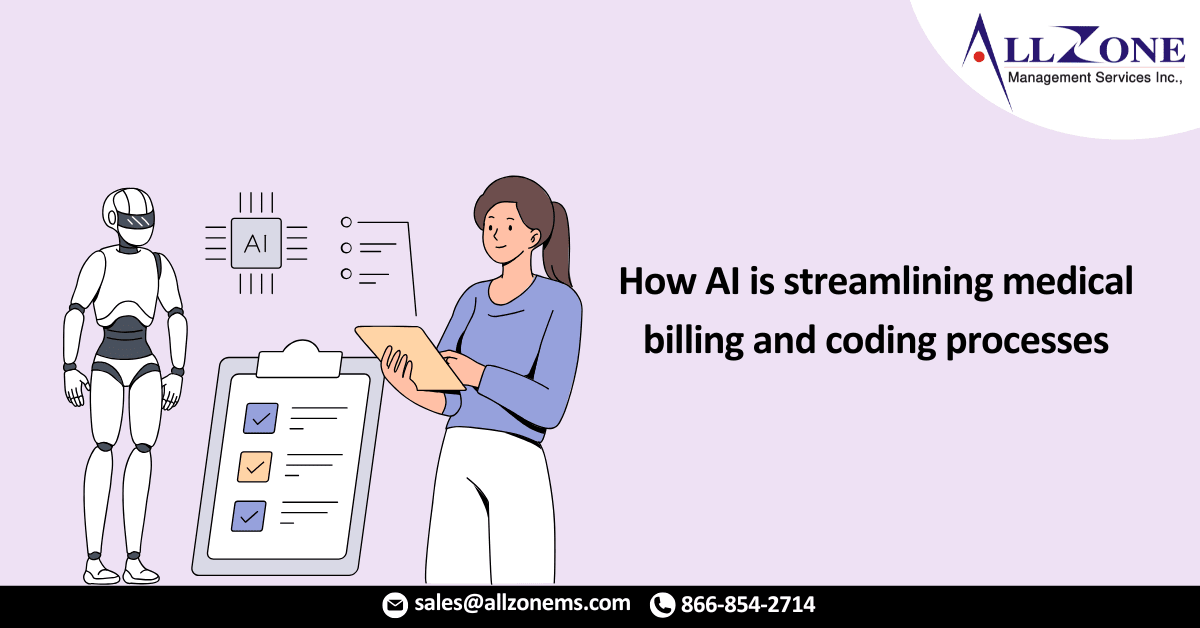Coding and medical billing with AI: Billing and coding processes in the healthcare industry are notoriously complex. The manual entry of data, the interpretation of physician notes, and maintaining compliance with ever-changing regulations all contribute to a system that is ripe for inefficiency and error. Healthcare providers and patients can save time, money, and frustration by leveraging Artificial Intelligence (AI) to streamline these processes.
The purpose of this newsletter is to explore how AI is revolutionizing medical billing and coding, and to identify its key benefits and potential future directions.
A Brighter Future for Medical Coding and medical billing with AI
1. Artificial Intelligence (AI) in Action: Automating tasks and reducing errors
Automation is one of the most significant ways in which AI impacts medical billing. With the aid of artificial intelligence software, vast amounts of patient data can be ingested from electronic health records (EHRs) and the relevant information can be automatically extracted for coding purposes. Diagnoses, procedures, medications, and even physician notes are included in this category. With Natural Language Processing (NLP), artificial intelligence can comprehend the subtleties of medical language, identify key details and translate them into the appropriate medical terminology.
Medical coders are freed up to focus on complex cases and quality control as a result of this automation. Moreover, AI’s ability to analyze large datasets minimizes the risk of errors that can cause claim denials and reimbursement delays by identifying and correcting inconsistencies in coding.
2. Reduced denial rates and improved accuracy
Healthcare providers are burdened by medical billing errors. Denials of claims may delay reimbursements for several months, affecting cash flow and straining resources. Using artificial intelligence to analyze historical data and identify coding patterns is an important part of ensuring consistency and accuracy. Coders are able to detect potential errors proactively with the aid of the software before submission, enabling them to address them as early as possible.
In recent studies, AI-powered coding systems have been shown to reduce the number of claims that are denied. As a result, healthcare providers will receive faster reimbursements, have better cash flow, and will have greater financial stability.
3. Predictive Analytics and Future Optimization
In addition to automating tasks and reducing errors, advanced artificial intelligence systems are capable of analyzing vast datasets and identifying trends using machine learning. Healthcare providers benefit from this approach because they can anticipate coding challenges and address them proactively. AI can predict which claims are most likely to be denied based on historical data and coding patterns. As a result of using this information, providers can focus their efforts on reviewing these claims in advance in order to minimize the risk of denials.
Artificial intelligence (AI) can also be used to optimize revenue cycle management (RCM) processes. As a result of analyzing data on coding practices, reimbursement rates, and payer behavior, artificial intelligence can suggest strategies that will improve revenue collection in the long term. Healthcare organizations can significantly improve their financial health by utilizing this forward-thinking approach.
The Human Touch: AI as a Partner, Not a Replacement
The use of artificial intelligence (AI) can offer significant benefits for medical billing and coding; however, it should be noted that it is not a complete substitute for human expertise. There will always be a need for medical coders, who possess a strong understanding of medical terminology and in-depth knowledge of medical procedures.
It is important to note, however, that AI can prove to be an effective partner, by automating tedious tasks and providing real-time guidance to coders. By doing so, they are able to concentrate on complex cases that require human judgment as well as ensure that the coding process is carried out in an accurate manner
Considerations and challenges
Medical billing and coding can benefit from artificial intelligence, but there are still challenges to overcome. It is important to ensure the security and privacy of data when investing in AI software, as the initial investment can be significant. A healthcare provider should also be prepared for ongoing training and maintenance of the system.
To ensure compliance with the complex and ever-changing medical coding regulations, a human element is required. Artificial intelligence should be viewed as a tool for augmenting human expertise, rather than replacing it altogether.
Streamline medical coding & medical billing with AI: Brighter Future for Medical Billing
Medical billing and coding are being transformed by artificial intelligence. Artificial intelligence enables healthcare providers to streamline their processes, reduce errors, improve financial performance, and ultimately dedicate more resources to delivering quality patient care by automating tasks, reducing errors, and providing valuable insights.
In the future, we can expect even greater benefits as AI technology continues to advance and become more sophisticated. There is no doubt that the future of medical billing is brighter than it has ever been, with AI playing a pivotal role in creating a system that is more efficient, accurate, and cost-effective for everyone involved.

